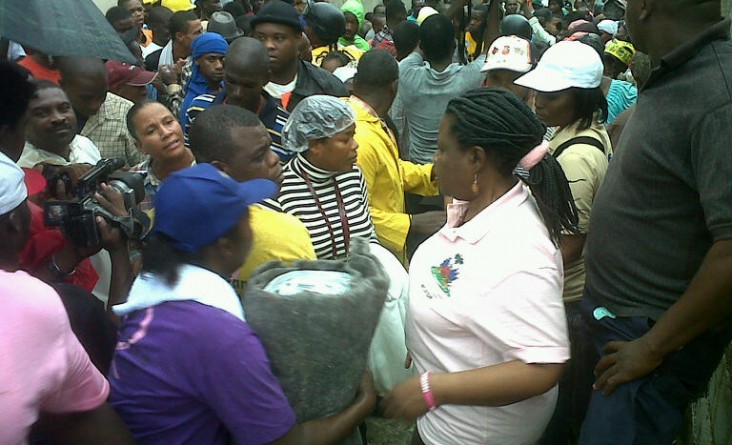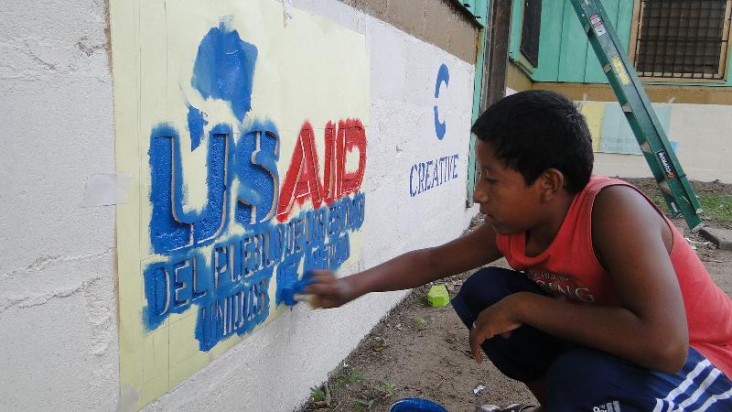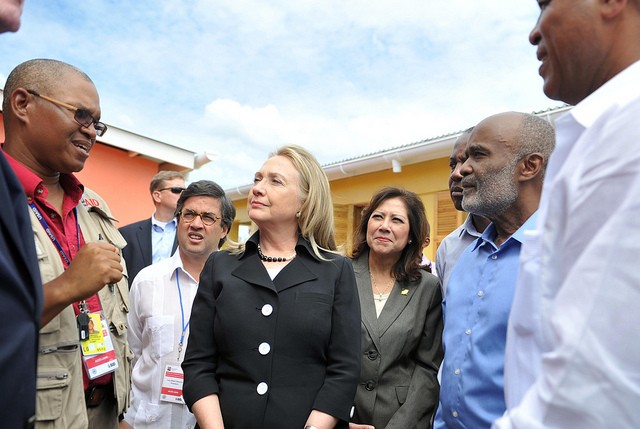
Volume Three, Issue Nineteen
Hurricane Sandy Relief Efforts in Haiti

Hurricane Sandy reached Haiti Oct. 24. And although hurricane-force winds did not directly affect the country, the storm's outer bands brought significant rainfall and strong winds to the southern region. Damages to agriculture and infrastructure are substantial, with several reports of collapsed bridge and impassible roads. Officials there say 1,372 homes have been destroyed. The death toll currently stands at 54, with 21 people reported missing and 20 injured.
The Government of Haiti has taken the lead in coordinating the response during and following Hurricane Sandy. Officials declared a month-long state of emergency on Oct. 31 and requested assistance from the U.S. Government, specifically for agricultural inputs, shelter and replacement non-food items in the south. Accordingly, U.S. Ambassador to Haiti Pamela A. White is issuing a disaster declaration for Hurricane Sandy.
USAID has distributed plastic sheeting to help approximately 10,000 people, family hygiene kits to help nearly 12,500 people, and an estimated 6,400 blankets. To help address serious food insecurity concerns, USAID is providing 50 metric tons of food aid to South Department and continues to discuss additional ways to assist with food insecurity in the country. Additionally, USAID has also provided items such as wheelbarrows and tools helpful for clean-up to displacement camps most affected by Sandy. The Haitian Government has allocated $8.3 million to aid affected areas. According to Prime Minister Laurent Lamothe, emergency coupons totaling $24 were also distributed on Friday to about 120,000 people.
- Video discussion about USAID response in Haiti: Sandy Beyond Borders.
- Details on the domestic response to Hurricane Sandy and how you can help.
New USAID Youth Policy

This week, USAID released its Policy on Youth in Development, the first Agency-wide guidance to recognize young people as a driving force in global development and promote youth participation as partners and leaders. With more than half of the global population under the age of 30 and a majority residing in developing countries, USAID and its new policy will support, prepare, engage and protect youth today as well as harness the energy and creativity of young people for positive change.
Read more about how USAID's Policy on Youth in Development will strengthen youth programming, participation and partnership across Agency initiatives and operations, as well as identify, support and promote research and innovation by, with and for youth.
Learn More:
- Blog: New USAID Policy on Youth in Development, by Susan Reichle
- Policy: Youth Policy [PDF]
- Web: USAID Youth Impact
Secretary Clinton Visits Haiti

Secretary of State Hillary Rodham Clinton traveled to northern Haiti on Oct. 22. In addition to making remarks at the inauguration of the Caracol Industrial Park, she visited the USAID-funded Caracol EKAM housing site and the USAID-constructed 10-megawatt power facility that will supply electricity to the Caracol Industrial Park and nearby areas.
USAID officials in attendance included Deputy Administrator Donald Steinberg, as well as Mark Feierstein and Beth Hogan, the assistant administrator and senior deputy assistant administrator in the Bureau for Latin America and Caribbean. During her trip, the secretary also met with President Michel Martelly, Prime Minister Laurent Lamothe, local and national elected officials, investors and community members.
More on DipNote: A New Day in Haiti
Devex Impact
Highlighted by USAID Administrator Rajiv Shah in a speech before Business for Social Responsibility's (BSR) 20th Anniversary Conference in October, Devex Impact connects professionals at the intersection of business and global development.
A global initiative of USAID and Devex, Devex Impact is an online community that fills a gap in connecting business professionals with development practitioners around the world. The site brings together USAID's expertise in building public-private partnerships with Devex, the world's largest development network connecting over 500,000 professionals and thousands of organizations. It provides breaking news, in-depth analysis and practical information, including a database of public-private partnership case studies, tools to help identify potential partners, and opportunities to discover new approaches to make an impact.
To join, visit www.devex.com/impact.
Atrocity Prevention

USAID and Humanity United launched the first two sub-challenges of the Tech Challenge for Atrocity Prevention at thetechchallenge.org on Oct. 31. For the next 30 days, submissions will be accepted for these two categories:
ENABLERS: Develop technologies to better identify and spotlight intentional or unintentional third-party enablers of atrocities (e.g. non-state actors such as multinational corporations, financial institutions or those who provide logistical support).
CAPTURE: Develop technologies that can enable the documentation of relevant evidence that may be used to deter or hold perpetrators accountable, while minimizing the risk posed to those collecting this information.
Prizes totaling $10,000 will be awarded within each challenge to individuals with creative ideas and prototypes that respond to the identified problem statements, based on:
- Feasibility
- Scalability
- Impact
- Innovation
USAID in the News
Huffington Post highlighted Feed the Future for working with the private sector and operating in an innovative manner to make foreign aid more effective. Also in the Huffington Post, Ming Holden blogged about the Frontiers in Development publication, the importance of "context" in discussions of foreign policy and aid, and USAID activities that understand context.
A Brookings op-ed by Rebecca Winthrop noted USAID's work in global education and focus on measurement and research to inform programming. Reuters highlighted the work of USAID in Pakita, Afghanistan for paving a highway section connecting Gardez with the neighboring province of Khost. The World Bank and International Finance Corporation's "Doing Business 2013" report announced that Kosovo made impressive gains in improving its business environment, the most progress among the 185 countries. USAID, through the Business Enabling Environment Program (BEEP), has collaborated extensively with the Government of Kosovo to remove obstacles to doing business and streamline business regulatory practices to make it easier for local entrepreneurs to be successful in the marketplace.
Have you Seen our Blog?
Check out the Impact Blog to stay updated on the latest information about USAID programs in Washington and around the world. Read stories from the field, hear from development experts, and view weekly photos and videos of development in action. You can also join the conversation on social media!








Comment
Make a general inquiry or suggest an improvement.